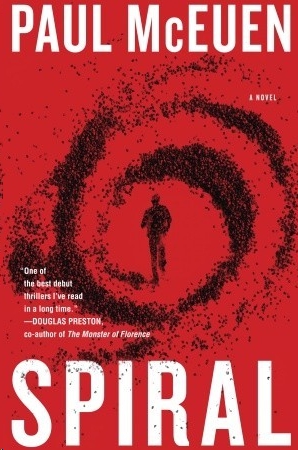
Spiral
A Novel
کتاب های مرتبط
- اطلاعات
- نقد و بررسی
- دیدگاه کاربران
نقد و بررسی

January 10, 2011
Set in and around the city of Ithaca, N.Y., Cornell physics professor McEuen's fiction debut successfully mixes science and suspense. When Liam Connor—an 86-year-old Cornell emeritus professor of biology, a Nobel Prize winner, and pioneer in the field of nanoscience—inexplicably jumps to his death off a bridge into one of Ithaca's gorges, the entire community is stunned, especially Connor's granddaughter, Maggie, and his academic confidant, professor Jake Sterling. But when micro-robots—silicon and metal constructs that Connor helped create—are found in his stomach, Maggie and Jake realize that he didn't commit suicide: he was tortured before being murdered. As they race to unravel cryptic messages Connor left behind, his ruthless killer plots to unleash an ingenious biological "doomsday weapon" with origins all the way back to WWII Japan. While the cutting-edge science and apocalyptic backdrop power the narrative, it's the cast of endearing characters and their interpersonal relationships and struggles that make this emotionally intense and thought-provoking novel so readable.

December 1, 2010
A Nobel Prize–winning science professor and his protégé must fend off a sophisticated lady assassin or lose a spore-producing bio-weapon that could kill millions.
Liam Connor, an Irish native, is a decorated fungus expert at Cornell. During World War II, when he was a chemical and germs weapon researcher in England, he was summoned to the USS North Dakota to interrogate a Japanese prisoner who was part of a chilling bio-warfare project. After secretly experimenting on scores of unsuspecting Japanese, his team perfected the fungus-based Uzumaki weapon. It was so lethal and fast-spreading that the United States dropped a nuclear bomb to destroy the last Japanese submarine carrying it. Flash forward 60-plus years. Connor, who secretly made off with the prisoner's small brass cylinder containing the last Uzumaki, has been working on an antidote to the weapon, which makes victims go mad and uncontrollably violent before causing fatal internal hemorrhaging. Abducted and tortured by the techno-brilliant assassin, Orchid, he leaps to his death to protect his granddaughter Maggie and 9-year-old great-grandson Dylan. The role of their protector is then taken on by Connor's young colleague Jake, who has eyes for Maggie. The notion of the world's fate resting on the efforts of this threesome is hard to swallow. And why does the assassin, who wastes no time killing other targets, not quickly dispatch Jake? Still, this is a fast-paced and suspenseful first novel, and in other ways as frighteningly plausible as UFOs. McEuen, a leader in nanoscience research at Cornell, makes unsettling use of recent developments in the field. Tiny robotic MicroCrawlers are used to inflict torture. After you've finished the book, try not hearing them go tink tink tink in the night.
An exciting and unsettling, if sometimes incredible, doomsday novel.
(COPYRIGHT (2010) KIRKUS REVIEWS/NIELSEN BUSINESS MEDIA, INC. ALL RIGHTS RESERVED.)

Starred review from February 1, 2011
Its hard to reckon with the realization that a prominent scientist in a cutting-edge field, writing his first novel in his spare time, has created what may be the most gripping and engrossing thriller this reviewer has ever read in almost 50 years of thriller reading. But facts are facts, and the opinion is considered. McEuen has created an indelible hero in 85-year-old Liam Connor, a diminutive scientific giant. But Liam dies at the hands of a brilliant, merciless female assassin within the first 50 pages. He is entrancing, and McEuens decision to kill him off so quickly shows authorial panache. Left to unravel a complex scheme to launch the most devastating terrorist attack in human history are Liams granddaughter, her nine-year-old son, and one of Liams colleagues, Jake Sterling, a Cornell physicist. McEuen, also a Cornell physicist, wisely writes about what he knowsscience, nanoscience, and Cornellbut also shows a true gift for plotting, pace, characterization, and writerly clarity. He mines relatively little-known history about Japans horrific experiments with biological weapons in WWII. He offers brief, lucid disquisitions on science; notes that a large university is the ideal place to begin a global plague; posits that synthetic biology will surpass silicon microelectronics as the next big technological wave; and remarkably, he makes these ideas accessible to typical thriller aficionados. A stunning achievement.(Reprinted with permission of Booklist, copyright 2011, American Library Association.)

























دیدگاه کاربران